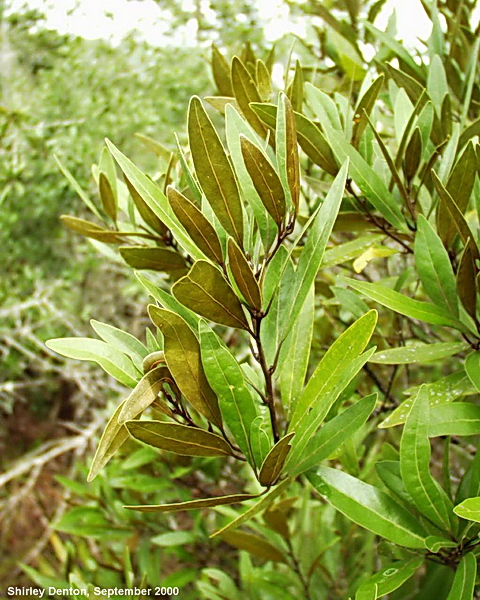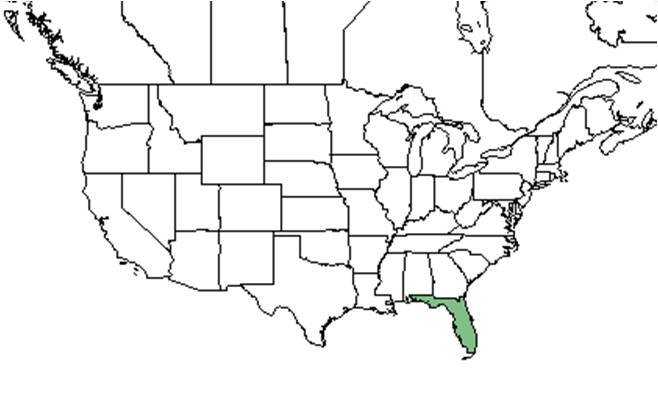Difference between revisions of "Persea humilis"
(→Conservation and Management) |
HaleighJoM (talk | contribs) (→Ecology) |
||
| (17 intermediate revisions by 7 users not shown) | |||
| Line 18: | Line 18: | ||
}} | }} | ||
| − | Common name: | + | Common name: Silk bay; Scrub bay<ref name="weakley">Weakley, A.S. 2015. Flora of the southern and mid-atlantic states. Working Draft of 21 May 2015. University of North Carolina at Chapel Hill, Chapel Hill, North Carolina.</ref>. |
==Taxonomic notes== | ==Taxonomic notes== | ||
| − | Synonyms: ''Tamala humilis'' (Nash) Small; ''Persea borbonia'' var. ''humilis'' (Nash) L.E. Kopp | + | Synonyms: ''Tamala humilis'' (Nash) Small; ''Persea borbonia'' var. ''humilis'' (Nash) L.E. Kopp.<ref name="weakley">Weakley, A.S. 2015. Flora of the southern and mid-atlantic states. Working Draft of 21 May 2015. University of North Carolina at Chapel Hill, Chapel Hill, North Carolina.</ref> |
| − | + | Varieties: none.<ref name="weakley">Weakley, A.S. 2015. Flora of the southern and mid-atlantic states. Working Draft of 21 May 2015. University of North Carolina at Chapel Hill, Chapel Hill, North Carolina.</ref> | |
==Description== | ==Description== | ||
<!-- Basic life history facts such as annual/perrenial, monoecious/dioecious, root morphology, seed type, etc. --> | <!-- Basic life history facts such as annual/perrenial, monoecious/dioecious, root morphology, seed type, etc. --> | ||
| − | A description of ''Persea humilis'' is provided in [http://efloras.org/florataxon.aspx?flora_id=1&taxon_id=233500901 The Flora of North America]. | + | A description of ''Persea humilis'' is provided in [http://efloras.org/florataxon.aspx?flora_id=1&taxon_id=233500901 The Flora of North America]. It is a tree/shrub with shiny, green leaves. The lower leaf surface has dense, appressed hairs with a rusty or blackish color, depending on the age. They are uniform across the surface of the veins. These hairs on the lower side of the leaf help reduce water loss. The peduncles are 1-3 cm long and the leaf blades are 5-8 cm long.<ref name="weakley">Weakley, A.S. 2015. Flora of the southern and mid-atlantic states. Working Draft of 21 May 2015. University of North Carolina at Chapel Hill, Chapel Hill, North Carolina.</ref> |
| − | |||
| − | |||
==Distribution== | ==Distribution== | ||
| − | ''P. humilis'' is limited to the scrubs of the Florida peninsula | + | ''P. humilis'' is limited to the scrubs of the Florida peninsula. |
==Ecology== | ==Ecology== | ||
===Habitat=== <!--Natural communities, human disturbed habitats, topography, hydrology, soils, light, fire regime requirements for removal of competition, etc.--> | ===Habitat=== <!--Natural communities, human disturbed habitats, topography, hydrology, soils, light, fire regime requirements for removal of competition, etc.--> | ||
| − | |||
| − | + | ''P. humilis'' has been found in sandhills, sand pine stands, sand pine scrub, coastal thicket, oak-pine-palmetto scrub, rosemary scrub, Turkey-oak and scrub pine woods, and Xerophytic oak scrub.<ref>Florida State University Herbarium Database. URL: http://herbarium.bio.fsu.edu. Last accessed: May 2021. Collectors: R. Kral, Walter S. Judd, and Robert F. Thorne. States and counties: Florida: Highlands, Marion, and Ocala.</ref><ref name="Texas"> Botanical Research Institute of Texas, Philecology Herbarium accessed using Southeastern Regional Network of Expertise and Collections (SERNEC) data portal. URL: http://sernecportal.org/portal/collections/index.php Last accessed: May 2021. Collectors: C. L. Lundell and Julie Perreau. States and Counties: Florida: Levy. Texas: Aransas.</ref><ref>Carnegie Museum of Natural History Herbarium accessed using Southeastern Regional Network of Expertise and Collections (SERNEC) data portal. URL: http://sernecportal.org/portal/collections/index.php Last accessed: May 2021. Collectors: Thompson, S.A. States and Counties: Florida: Marion.</ref><ref>Eastern Kentucky University, Ronald L. Jones Herbarium accessed using Southeastern Regional Network of Expertise and Collections (SERNEC) data portal. URL: http://sernecportal.org/portal/collections/index.php Last accessed: May 2021. Collectors: B. Eugene Wofford. States and Counties: Florida: Ocala.</ref> It is also found in disturbed areas including along roadsides and powerline clearings.<ref>Archbold Biological Station herbarium accessed using Southeastern Regional Network of Expertise and Collections (SERNEC) data portal. URL: http://sernecportal.org/portal/collections/index.php Last accessed: May 2021. Collectors: A. Arcuri, Vander Kloet, D. Richardson, and R.P. Wunderlin. States and Counties: Florida: Highlands, Marion, and Ocala.</ref> Associated species: ''Quercus laevis, Quercus geminata, Vitis munsoniana, Quercus inopina, Helianthemum nashii'' and ''Pinus palustris.''<ref name="Texas"/><ref>Clemson University Herbarium accessed using Southeastern Regional Network of Expertise and Collections (SERNEC) data portal. URL: http://sernecportal.org/portal/collections/index.php Last accessed: May 2021. Collectors: Patrick D. McMillan. States and Counties: Florida: Polk.</ref> | |
| − | < | + | |
| − | < | ||
| − | < | ||
===Pollination=== | ===Pollination=== | ||
| − | + | ''Persea humilis'' has been observed at the Archbold Biological Station to host plasterer bees from the Colletidae family such as ''Colletes brimleyi'' and ''C. nudus'', sweat bees from the Halictidae family such as ''Augochlorella aurata'' and ''Augochloropsis metallica'', thread-waisted wasps from the Sphecidae family such as ''Bicyrtes quadrifasciata'' and ''Cerceris fumipennis'', and wasps from the Vespidae family such as ''Euodynerus apopkensis, Polistes metricus'' and ''Pseudodynerus quadrisectus''.<ref name="Deyrup 2015">Deyrup, M.A. and N.D. 2015. Database of observations of Hymenoptera visitations to flowers of plants on Archbold Biological Station, Florida, USA.</ref> | |
| − | + | <!--===Herbivory and toxicology===--> <!--Common herbivores, granivory, insect hosting, poisonous chemicals, allelopathy, etc--> | |
| − | Colletidae | ||
| − | |||
| − | Halictidae | ||
| − | |||
| − | Sphecidae | ||
| − | |||
| − | Vespidae | ||
| − | <!--=== | ||
<!--===Diseases and parasites===--> | <!--===Diseases and parasites===--> | ||
| − | ==Conservation and | + | ==Conservation, cultivation, and restoration== |
| − | == | + | ==Cultural use== |
==Photo Gallery== | ==Photo Gallery== | ||
<gallery widths=180px> | <gallery widths=180px> | ||
| Line 62: | Line 49: | ||
==References and notes== | ==References and notes== | ||
| − | |||
Latest revision as of 12:25, 15 July 2022
| Persea humilis | |
|---|---|

| |
| Photo by Shirley Denton (Copyrighted, use by photographer’s permission only), Nature Photography by Shirley Denton | |
| Scientific classification | |
| Kingdom: | Plantae |
| Division: | Magnoliophyta - Flowering plants |
| Class: | Magnoliopsida – Dicotyledons |
| Order: | Laurales |
| Family: | Lauraceae |
| Genus: | Persea |
| Species: | P. humilis |
| Binomial name | |
| Persea humilis Nash | |

| |
| Natural range of Persea humilis from USDA NRCS Plants Database. | |
Common name: Silk bay; Scrub bay[1].
Contents
Taxonomic notes
Synonyms: Tamala humilis (Nash) Small; Persea borbonia var. humilis (Nash) L.E. Kopp.[1]
Varieties: none.[1]
Description
A description of Persea humilis is provided in The Flora of North America. It is a tree/shrub with shiny, green leaves. The lower leaf surface has dense, appressed hairs with a rusty or blackish color, depending on the age. They are uniform across the surface of the veins. These hairs on the lower side of the leaf help reduce water loss. The peduncles are 1-3 cm long and the leaf blades are 5-8 cm long.[1]
Distribution
P. humilis is limited to the scrubs of the Florida peninsula.
Ecology
Habitat
P. humilis has been found in sandhills, sand pine stands, sand pine scrub, coastal thicket, oak-pine-palmetto scrub, rosemary scrub, Turkey-oak and scrub pine woods, and Xerophytic oak scrub.[2][3][4][5] It is also found in disturbed areas including along roadsides and powerline clearings.[6] Associated species: Quercus laevis, Quercus geminata, Vitis munsoniana, Quercus inopina, Helianthemum nashii and Pinus palustris.[3][7]
Pollination
Persea humilis has been observed at the Archbold Biological Station to host plasterer bees from the Colletidae family such as Colletes brimleyi and C. nudus, sweat bees from the Halictidae family such as Augochlorella aurata and Augochloropsis metallica, thread-waisted wasps from the Sphecidae family such as Bicyrtes quadrifasciata and Cerceris fumipennis, and wasps from the Vespidae family such as Euodynerus apopkensis, Polistes metricus and Pseudodynerus quadrisectus.[8]
Conservation, cultivation, and restoration
Cultural use
Photo Gallery
References and notes
- ↑ 1.0 1.1 1.2 1.3 Weakley, A.S. 2015. Flora of the southern and mid-atlantic states. Working Draft of 21 May 2015. University of North Carolina at Chapel Hill, Chapel Hill, North Carolina.
- ↑ Florida State University Herbarium Database. URL: http://herbarium.bio.fsu.edu. Last accessed: May 2021. Collectors: R. Kral, Walter S. Judd, and Robert F. Thorne. States and counties: Florida: Highlands, Marion, and Ocala.
- ↑ 3.0 3.1 Botanical Research Institute of Texas, Philecology Herbarium accessed using Southeastern Regional Network of Expertise and Collections (SERNEC) data portal. URL: http://sernecportal.org/portal/collections/index.php Last accessed: May 2021. Collectors: C. L. Lundell and Julie Perreau. States and Counties: Florida: Levy. Texas: Aransas.
- ↑ Carnegie Museum of Natural History Herbarium accessed using Southeastern Regional Network of Expertise and Collections (SERNEC) data portal. URL: http://sernecportal.org/portal/collections/index.php Last accessed: May 2021. Collectors: Thompson, S.A. States and Counties: Florida: Marion.
- ↑ Eastern Kentucky University, Ronald L. Jones Herbarium accessed using Southeastern Regional Network of Expertise and Collections (SERNEC) data portal. URL: http://sernecportal.org/portal/collections/index.php Last accessed: May 2021. Collectors: B. Eugene Wofford. States and Counties: Florida: Ocala.
- ↑ Archbold Biological Station herbarium accessed using Southeastern Regional Network of Expertise and Collections (SERNEC) data portal. URL: http://sernecportal.org/portal/collections/index.php Last accessed: May 2021. Collectors: A. Arcuri, Vander Kloet, D. Richardson, and R.P. Wunderlin. States and Counties: Florida: Highlands, Marion, and Ocala.
- ↑ Clemson University Herbarium accessed using Southeastern Regional Network of Expertise and Collections (SERNEC) data portal. URL: http://sernecportal.org/portal/collections/index.php Last accessed: May 2021. Collectors: Patrick D. McMillan. States and Counties: Florida: Polk.
- ↑ Deyrup, M.A. and N.D. 2015. Database of observations of Hymenoptera visitations to flowers of plants on Archbold Biological Station, Florida, USA.